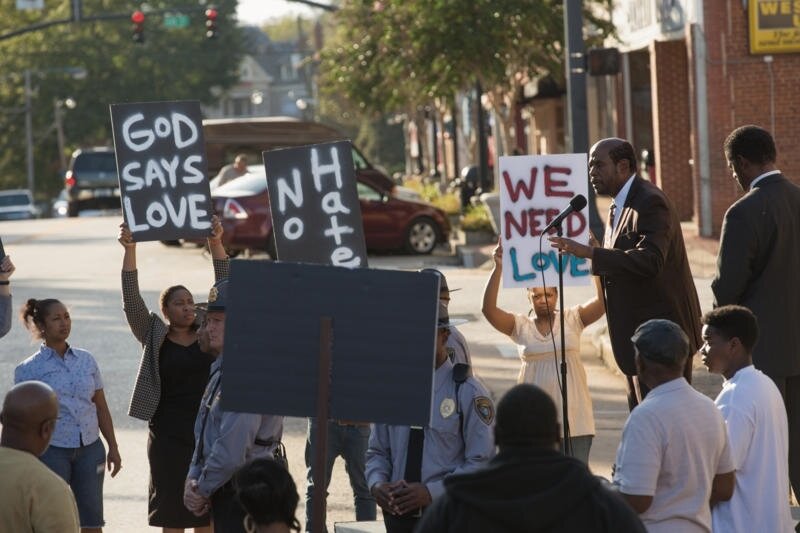Even a stellar cast can't alleviate the well-meaning 'Burden'
By Andrea Thompson
Even if the well-meaning, anti-racism drama “Burden” makes some missteps in its firm commitment in conveying its themes of hope and redemption after hate, it's got enough going for it to be merely misguided rather than insulting. Any film that's accompanied by the based on a true story label is enough to make me queasy already, and the tale of a former Klansman who disavows the KKK with some help from his loving girlfriend and a black reverend of a Baptist church is certainly a heavy topic for a first-time writer-director.
Said filmmaker Andrew Heckler certainly knows how to make an interesting first impression, kicking off “Burden” with a bunch of rednecks – it's the only way to describe them – at first conforming, then seeming to transcend stereotypes as they all laugh, joke, and comfortably interact while they demolish the interior of a building. It's only when the building's purpose is revealed that these good ol' boys are likewise shown for what they are: Klansmen. In other words? Actually, they are those evil rednecks. And what they've been constructing is a museum dedicated to the KKK, which they're all a part of.
One of the most active is Mike Burden (Garrett Hedlund), who's more sympathetic than most...in the abstract anyway. He's an orphan who was raised in and by the Klan, and these people are the only family he has, and the only source of love he's known for most of his life. What kicks off his transformation the love of a good woman Judy (Andrea Riseborough), or at least one who's smart enough to see what's what. Mostly. Judy is unaware of who he is at first, but secrets don't last long in their small South Carolina town, although she remains with Mike after learning of his affiliations. Hoping to change your boyfriend rarely works out well, but Mike's involvement with Judy has actual positive effects, like exposing him to people who don't base their identity on hate and becoming him less involved in Klan activities.
Mike eventually experiences enough of a crisis to leave the Klan, and it's what comes after that makes “Burden” slightly more insightful. Mike and Judy experience immediate consequences for his decision, as they're both kicked out of their homes, lose their jobs, and find themselves homeless. When Reverend Kennedy (Forest Whitaker), an active, vocal opponent to the KKK museum, makes the decision to not only help Mike and Judy, but invite them to stay with him and his family, it doesn't exactly make for some feel-good moments. Mike isn't too happy or grateful for Kennedy's kindness, and Kennedy's family and community aren't the most supportive of his decision either. It's not exactly rocket science, but “Burden” is at least aware that disavowing a past filled with racism and hate isn't enough; redemption requires far more, such as taking responsibility and other tangible actions.
Thankfully, Reverend Kennedy gets about as much screen time as Mike, and “Burden” uses it to make Kennedy not only a full human being who is capable of things such as anger and frustration, but expose the effect Mike and those like him have on his community, just in case it needed to be stated. That said, there's a reason Mike dominates the review, and that's partly due to the movie teetering dangerously close to suggesting that it's up to women and POC to help white people recover from racism. If it weren't for the talented cast, “Burden” might have overturned entirely. Then again, the ends seem to justify the means somewhat, since there's little acknowledgment of just how much this situation could've gone horrifically wrong, not to mention a lack of accountability for Judy for remaining involved with someone she knows is a vicious racist. Given the state of things, we'd all love to believe that the people spewing hate are capable of more, but such a predictable story and environment doesn't exactly lend itself to depth. It can even ironically end of reassuring those who most need to reflect on their role in where we've found ourselves today.
Grade: C+






